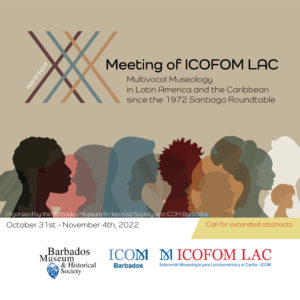ICOFOM LAC Previous Conferences
XXXII ICOFOM LAC Annual Meeting
PROGRAMME: Programme ENG
Call for Papers
ICOFOM LAC is pleased to announce that the Call for Papers is open for the XXXII Annual Meeting “Museology, Research and Education”.
This theme, proposed by the International Council of Museums (ICOM) to commemorate International Museum Day, invites us to reflect on the crucial role that museums play in our societies and the key role that both education and research play in our institutions.
During this conference, we will explore how museums can become agents of positive change, promoting equitable access to culture, education and information. We will analyse innovative experiences, best practices and emerging challenges in the management and operation of museums in our region, with the aim of inspiring concrete actions that promote the democratization of cultural heritage.
Find more information on the panel themes for this year’s meeting, and how to submit your paper here: Doc1ICOFOMLAC2024 ENG (1)
Deadline for submission is: August 31st, 2024
Register for the XXXII Meeting of ICOFOM LAC via this link: https://forms.gle/HGnh5sA3i3HXJjnK7
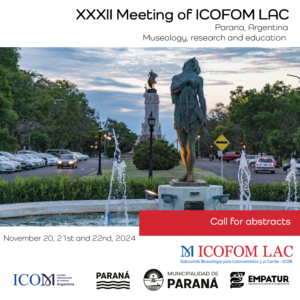
XXXI ICOFOM LAC Annual Symposium
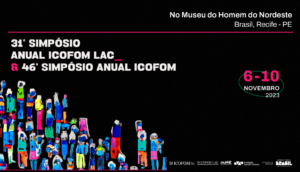
ABSTRACTS BOOKLET: Abstracts Booklet
REGISTRATION: https://www.even3.com.br/icofomlac/
PROGRAMME: PROGRAMA ANEXO
Call for Papers
ICOFOM LAC is pleased to announce that the Call for Papers is open for the XXXI Annual Symposium “Histories of Latin American and Caribbean museology: subjects, diversity and plurality of experiences”.
Thinking about the History of Museology from the perspective of subjects, diversity and plurality of experiences, requires a theoretical and methodological exercise that can question the discourses considered to be foundations of what we understand by museology in our region. It is about a critical perspective on societies, their processes of colonization and decolonization, that is anti-racist, inclusive and based on genders and their dissidences. This challenges us to think about the historical processes that constituted and still constitute Latin American and Caribbean museology, confronting the processes of homogenization and the classification models that exerted control over experiences and perceptions, silencing the arrangements, epistemologies and practices considered outside the norm, limiting knowledge about our perception of society and culture. The recognition of the diversity that characterizes us, through the nomination of collections, objects and narratives of the subjects that make up the museological processes of our region, projects us towards new possibilities, new knowledge and reveals a clearer image of Latin American and Caribbean museology, allowing the rewriting of our trajectories.
Find more information on the panel themes for this year symposium, and how to submit your paper here: ENG CFP
Deadline for submission is August 9th 2023
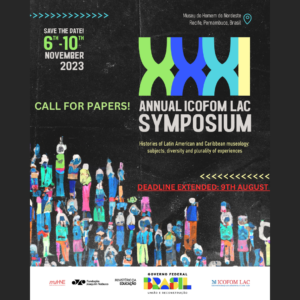
30th ICOFOM LAC Regional Meeting
REGISTRATION LINK: https://forms.gle/7nWviNDBrMb9gDfs5
PROGRAMME: ICOFOM LAC PROGRAMME ENG
Abstracts Booklet: ISBN PAGES cuaderno resumenes ICOFOMLAC
Call for Abstracts
We are pleased to share the call for extended abstracts for the 30th ICOFOM LAC Meeting:
Under the theme Multivocal Museology in Latin America and the Caribbean since the 1972 Santiago Roundtable, we invite submissions to four panels: Revisiting the Classics – Multivocal Museology in Latin America and the Caribbean since the 1972 Santiago Roundtable; Alternative methodologies in Museology developed in the LAC region; Taboos in Museology – the multivocal and multilingual nature of practices in Latin America and the Caribbean; and Museology arising out of interpretation sites of memory.
Deadline for submission is August 15th, 2022.
29th ICOFOM LAC REGIONAL MEETING
Abstract Booklet: ICOFOM LAC Caderno de resumos Mexico 2021
Register here
The programme for the XXIX ICOFOM LAC Meeting is now available! View the programme here: Programa ICOFOM_Inglés
Call for extended abstracts for the 29th ICOFOM LAC Meeting Panels
Find the call for extended abstracts here: CALL ENG – FINAL
We invite you to participate in the XXIX Meeting of ICOFOM LAC
9th – 12th November, 2021
Theme: “The Decolonization of Museology in Latin America and the Caribbean: Museums, Mixing and Myths of Origin”
Organized with ENCRyM, Mexico
Free online event
28th ICOFOM LAM REGIONAL MEETING
“Towards a definition of the museum from a Latin American and Caribbean perspective: epistemological foundations”
November 4th -6th (Virtual mode)
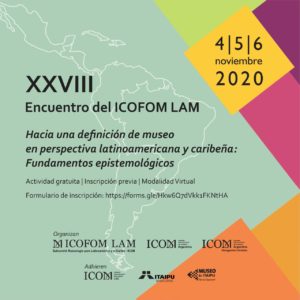
From 1992 to 2019 the ICOFOM LAM held annual meetings and an international Working Group in different countries, stirring the interest among ICOM’s members.
27th ICOFOM LAM Meeting
“Museum, traditions and collective construction in Latin America and the Caribbean. Theoretical approaches” November 25th – 28th.
Place: Universidad del Valle de Guatemala
Co-organizers: ICOFOM LAM, UMAC Latin American Group, ICOM El Salvador, Universidad del Valle de Guatemala, Universidad Tecnológica del Salvador.
PROGRAM
1st NOTICE
Programa Preliminar
———————————————————————————————————————
26th ICOFOM LAM Meeting / CECA & UMAC Group
International Meeting
¨Hyperconnected Museum Organizations. Museology, Education and Cultural Action¨
Hernandarias and Asunción, Paraguay, 8th to 11th of November, 2018.
Second Notice
Dear colleagues and friends:
We want to inform you about the venue and the travel options for the meeting.
On the website http://icompy.itaipu.gov.py you can find updated information about schedules, registration, lodging options, and more.
Registration
Registering is free; however, it is mandatory for all participants to register on the website from July 20 to October 15, or until we reach the maximum number of participants.
The seat of the meeting: ITAIPU Binacional and the Museum of ITAIPU – Guarani Land
ITAIPU Binacional is the world’s largest hydroelectric power plant in terms of electricity production, a binational property of Paraguay and Brazil. It is located on Parana River, in Hernandarias municipality, on the Paraguayan side. There, ITAIPU is the core of the social, cultural and environmental development of Paraguay, giving a boost to many community, multinational and interinstitutional projects, creating a sustainable society. Its influence covers the Biosphere Reserve of ITAIPU, acknowledged by UNESCO in 2017.
The ITAIPU museum was created in 1979 to host and spread the results of archeological, historical, anthropological and biological researches developed in Alto Parana and Canindeyu during the construction of the dam and the reservoir. Throughout the years, it has become one of the most important museums in Paraguay, driving forward conservation, education and research programs in the region. In the museum and action setting, we can mention the history and formation of ITAIPU Binacional, and the culture and land of the Guarani people.
The meeting will take place in the Reception Center of ITAIPU, located in Hernandarias city, Paraguay, in the first three days and the last day will be a trip to Asunción to visit the university museums.
Call for Papers
During the meeting, museum professionals will have the opportunity to share their experiences in the individual sessions. They can present in Spanish or Portuguese. We accept the following formats:
Normal presentation (permitted time: 15 minutes)
It should be a strict and critical presentation on a theme related to the suggested subthemes.
Research presentation (permitted time: 20 minutes)
A presentation that includes a question about the research area, the methods, the results and interpretation. The data has to be presented within the permitted time.
Market of ideas (permitted time: 7 minutes)
The presentation should describe a concrete project or an idea developed by the museum. Its result and experience must have a novel character, which can be interesting for other museums as well.
Posters (unlimited time)
A poster with a clear and short presentation, which can include photos, figures, text, involving important aspects of theme. It must have the following information: author’s name, institution, direction, e-mail, identification, and the importance of the theme, the project results or final product, consequences and follow-up.
Every international committee has established a theme for their sessions:
1. Subcommittee Museology for Latin America and the Caribbean (ICOFOM LAM)
E-mail for sending papers: infoicofomlam@gmail.com copy eregionalicompy2018@gmail.com
ICOFOM LAM tables will accept talks on the following themes:
– Revisiting the classics: 2018 Felipe Lacouture Year.
The dissemination of the ideas of Museology pioneers and the discussion of their works through the lenses of our current times is a fundamental goal for ICOFOM LAM. Their theoretical contribution feeds the new generation of professionals, creating new and productive discussions. The Czech author S. Stransky, the Argentinian Norma Rusconi and the Brazilian Waldisa Rússio were the visited autors in the previous events. This year it is time for the Mexican Felipe Lacouture, who taught museology in many places throughout Latin America.
– Museology and critical approach.
Following the expansion of critical approach in human sciences, the critical museum studies as well as museum practices, showed their presence in the last 30 years through a vast and diverse production. The emergence of postcolonial studies, with the inclusion of gender and “the others” in the museum field has particular shapes in our region due to its characteristics. This table invites you to present papers that question the traditional museum approaches, showing how it is being discussed in Latin America and the Caribbean.
Papers that consider the museum hyperconnectivity from critical perspectives will be welcome in this occasion, although not exclusively.
– Reflections on Latin American and Caribbean museums in hyperconnected surroundings.
This table invites people to think about the digital technologies as a structural part of contemporary society that create new practices and phenomena, questioning the museum universe. Therefore, it is important to think how the relationship between that and the museums of Latin America and the Caribbean: as instruments to optimize services or as a structural part of contemporary approach of the institution? How do we discuss in our region the hyperconnection in museum surroundings and in organizations that involve cultural management?
2. International Committee for Education and Cultural Action (CECA)
E-mail for sending papers: ceca@centroalfonsina.com.ar copy eregionalicompy2018@gmail.com
The name CECA bring important issues in a museum: education and cultural action. This Regional Latin American Meeting aims to discuss the expression “cultural action”, theme that will be debated in the annual conference in Tblisi (Georgia), in September. The objective is to think about all the possible meanings of the concept of “cultural action” in different countries, and we believe that this Meeting is another possibility to approach different visions on the theme.
The expression “cultural action” was first a general term to express actions that created a stronger connection between the cultural and artistic community and the audience, as a part of the cultural policy developed in France in 1960s.
Nowadays, more than 50 years later, this expression does not seem to be clear. The answers on CECA survey in 2017 showed that “cultural action” is related to formal and informal learning, that is, learning processes not related to school groups.
Considering this theme and also the theme chosen by ICOM for the international museum day in 2018: “Hyperconnected museums: new perspectives, new audiences”, CECA board suggests for the individual session, that will take place on November 9, the following theme: Museums, Education and Cultural Action: Among Old and New Meanings.
We want this session to have some conceptual questions that can guide us to a better comprehension and development of the proposed activities, as a way to reflect and present a larger number of experiences and connect the professionals of this area. We bring the following questions:
– What does the term “cultural action” refer to?
– What connection does it have with museum education”?
– How do cultural actions and education contribute to the museum’s mission?
– What kind of cultural action does a museum implement? To whom?
– How do museums use their facilities, collections and staff to develop a cultural action?
– Cultural democratization and cultural democracy. The mediation role.
– Museum visits; individual visitors and visitors with families.
– Education and cultural actions for audiences and no-audiences;
– Working outside museums’ walls;
– From visitor to user (digital audiences);
– Museums and activism;
– Museums as a stage for cultural activities.
3. Group of University Museums and Collections (UMAC)
E-mail for sending papers: museosuniversitariosmx@gmail.com copy eregionalicompy2018@gmail.com
University museums and their collections have a long trajectory in Latin America. Some date back to colonial times, others appeared after movements of autonomous universities. These museums have one element in common: their response to the needs of teaching, research and dissemination of university culture.
Nowadays many Latin American universities not only take take care of cultural goods, but also are responsible for the safekeeping, preservation and dissemination of natural and cultural heritage beyond their boundaries, performing a fundamental role for the society and our planet.
In this process, there are many convergences connecting us, and other divergences that make us different. In both cases, it is important to stand out, know and share similarities and differences to strengthen the bonds, setting up support areas and build interchange and collaboration networks to consolidate our works and give more visibility to university museums and collections.
The hyperconnectivity that the ITCs offer us is the ideal tool to develop and fortify these bonds from a distance, taking advantage of the Caribbean and Latin American institutions.
For individual sessions, we are looking for papers related to the experience in university museums in the region as far as concerned to the formation of themselves, their challenges, especial programs, critical approach, and examples of interinstitutional and interregional integration.
LAST DATE FOR PRESENTING PROPOSALS FOR ALL SESSIONS AND ALL COMMITTEES: SEPTEMBER 7, 2018.
The scientific board will evaluate the proposals of papers and will select the best ones to be exposed on November 9th, during the individual sessions in the committees. The selection will be presented on September 17th, 2018.
The proposals must be on PDF format, A4 size, font Arial 12, line spacing 1.5, and must not exceed 25000 characters (with spaces). The papers must have title, author(s), institutional information, contact information (including e-mail), and an abstract with a maximum of 250 words.
For posters: the size must be A0 (841mm x 1189mm); with the presented information in vertical. The participants must bring their posters printed and ready to be set.
How do I get there?
The Guarani ITAIPU Museum is strategically located at the Tripoint (Paraguay, Brazil Argentina). You can access the location through any international airport in the surroundings: at Ciudad del Este (Paraguay), Puerto Iguazu (Argentina) and Foz do Iguaçu (Brazil). Some hotels offer free transfer from the airport to the lodging accommodation.
For the participants arriving on November 7 from any of airports mentioned above, our organization is offering transfer from the airport to the accommodations recommended by us, or to places near the recommended accommodations. Buses timetable will be available for those interested in this service.
From Asunción (Paraguay)
By airplane to the International Airport Silvio Pettirossi. To get to Ciudad del Este, there are connecting flights to Guarani International Airport, and you can also travel by bus (there are many bus companies departing in every two hours from the Asunción bus station – Terminal de Asunción – to Ciudad del Este bus station – Terminal de Ciudad del Este. For security reasons and your comfort, we recommend traveling with the bus company Nuestra Señora de la Asunción). The bus tickets can be bought on www.nsa.com.py or on the ticket booth at the bus station. The trip from Asunción to Ciudad del Este is about 5 hours.
From Ciudad del Este (Paraguay)
By airplane to Guarani International Airport. You can take a taxi from the airport to the place where you stay or to the venue.
From Foz do Iguaçu (Brazil)
By airplane to the Cataratas International Airport. There are many bus and taxi options to get to Ciudad del Este or Hernandarias.
From Puerto Iguazu (Argentina)
By Airplane to the Cataratas del Iguazu International Airport. There are many bus and taxi options to get to Ciudad del Este or Hernandarias.
Accommodations
In Ciudad del Este and Hernandarias there are many lodging options, with varied prices. Hernandarias also has three inns, with rooms with breakfast included, for lower prices.
On the website our organization will update the list of recommended hotels.
———————————————————————————————–
International Conference on the Definition of 21st Century Museum

Argentina Symposium Report
…………………………………………………………………………………………………………………………………………….
25th ICOFOM LAM Meeting / 40th ICOFOM Annual Symposium The politics and poetics of Museology. La Habana, Cuba: 25th to 29th of September, 2017.
Table: Revisiting the Classics: Russio year 2017
Program
This year we are going to change our ICOFOM LAM Board and the election will take place in Havana, Cuba, during our 25th Meeting that will happen next week.
We are inviting our all ICOFOM LAM members to register his/her vote in case of not attending the meeting, to send his/her voting form to the following e-mail icofomlam.elecciones@gmail.com before September 23th, 2017.
Voting form
Candidates list
————————————————————————————————————————
3er Seminario de Alfabetización en Teoría Museológica
Tilcara, Jujuy – Argentina – Agosto 2016
Programa
1er Circular
2da Circular
3era Circular
Ficha de Inscripción
………………………………………………………………………………………………………
XXIII ICOFOM LAM Meeting
Diversities and Confluences in the Latin American Museology Thinking
Panama, November 18th-19th-20th, 2015
Round table themes
– Round table 1: Museums in the museological discussion
Although museums play an important role in the museological discussions, there is not always a clear distinction in the productions between their role as objects of disciplinary knowledge and the technical aspects of the exercise of their institutional functions. What are the boundaries between the specificities of the museological thinking and the museum practices? What is the role of the museum as institution in the consolidation of a specific field of knowledge?
– Round Table 2. Museology and critical approach
In line with the expansion of the critical approaches in humanities, these approaches have also been important in museology for the last 25 years with a vast and varied production. The “critical museologies” or critical approaches applied to museology, cover a wide range of perspectives that go from the initial work of the theorists of the Frankfurt School to the ways of thinking that are currently being produced. How do these approaches work in Latin America and the Caribbean?
– Round table 3: Revisiting the classics: 2015, year of Stransky
In 1960’s, one of the main figures in the discussion of the museological theory, the theorist Czech Z.Z. Stránský among his significant contributions declared the aim of Museology is not the museum. How contemporary does this position keep being? How can Stránský’s ideas influence our Latin American reflections? How far will we advance and go back? This table stimulates us to realize a critical reading of his contributions adapting them to the current conceptions in Latin America.
– Round table 4: ICTs and museology: a paradigm change
The information and communication technology (ICT) as a structural part of the contemporary society are also part of the current universe of museums. So actually the question is how to see the ICT- museums relationship in Latin America and the Caribbean: As instruments to optimize services, or as a structural part of the contemporary approach to the museum organization? How does Latin America see the 2.0 museums?
………………………………………………………………………………………………………..
–New Tendencies for Museology in Latin America. 22nd ICOFOM LAM Meeting. Buenos Aires, 2014.
–Museology, Heritage, Interculturality: inclusive museums, development and intercultural dialogue. 21st ICOFOM LAM Meeting and 4th Seminar on Museological Investigation of Portuguese and Spanish speaking countries (4th SIAM). Petropolis, 2012.
–Museology, Education and Cultural action – interfaces. 20th ICOFOM LAM Meeting, Quito, 2011.
–The contemporary museological thinking in Portuguese and Spanish speaking countries. 19th ICOFOM LAM Meeting and 2nd Seminar on Museological Investigation. Buenos Aires, 2010.
–Museology and Whole Museum in Latin America and the Caribbean scene. 18th ICOFOM LAM Meeting. Santiago, Chile, 2009.
–Museology as a disciplinar field. 17th Meeting of ICOFOM LAM. Rio de Janeiro, 2008.
–Museology and Technology – a knowledge field. 16th ICOFOM LAM Meeting. Vienna, 2007.
–Museology e History: a knowledge field. 15Th ICOFOM LAM Meeting and 29th International ICOFOM Symposium. Alta Gracia, 2006.
–Museology and heritage: interpretation and communication in Latin America and the Caribbean. 14th ICOFOM LAM Meeting. Lima, 2005.
–Museology and intangible heritage in Latin America and the Caribbean: am integrating approach. 13rd ICOFOM LAM Meeting. Antigua Guatemala, 2004.
–Museology and regional heritage in Latin America and the Caribbean. 12th ICOFOM LAM Meeting. Salvador, Brazil, 2003.
–Museology and presentation: original/real or virtual. 11th ICOFOM LAM Meeting. Cuenca and Galapagos Islands, 2002.
–Museums, museology and intangible heritage. 10th ICOFOM LAM Meeting. Montevideo and Punta del Este, 2001.
– Museology and sustainable development. 9th ICOFOM LAM Meeting, Río de Janeiro, 2000.
– Museology, philosophy and identity in Latin America and the Caribbean. 8th ICOFOM LAM Meeting, Coro, 1999.
– Museums, Museology and cultural diversity. 7th ICOFOM LAM Meeting and International Museology Colloquium of Mexico. Xochimilco, 1998.
– Museology and memory. 6th ICOFOM LAM Meeting. Cuenca, 1997.
– Museology ant Art. 5th ICOFOM LAM Meeting and 17th ICOFOM Annual Symposium. Río de Janeiro, 1996.
– Heritage, museum and turism. 5th ICOFOM LAM Meeting and 17th ICOFOM Annual Symposium. 4th ICOFOM LAM Meeting. Barquisimeto, April 23-26, 1995.
– Museology, education and community action. 3rd ICOFOM LAM Meeting and Annual Meeting of CECA Museums. Education, Natural social and cultural heritage: interdisciplinary session CECA/ICOFOM LAM. Cuenca, 1994.
– Museum, spaces and power in Latin America and the Caribbean. 2nd ICOFOM LAM Meeting. Quito, July 18-23, 1993.
– Museums, society and environment: an integrated trilogy. 1st ICOFOM LAM Meeting. Buenos Aires, 1992.
